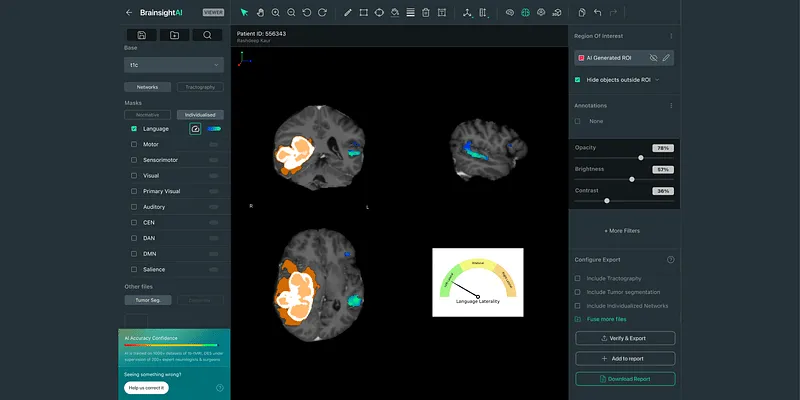
Social Alpha
View Brand PublisherHow BrainSightAI is revolutionising diagnosis for neurological and psychiatric disorders
Healthtech startup BrainSightAI leverages AI and ML for brain mapping. These maps aid in the diagnosis and prognosis of neurological and psychiatric problems through evidence-based treatment hooks.
For years, conversations about mental and to a lesser but still significant extent, brain health were pushed under the carpet due to stigma and societal conditioning. As per Deloitte Insights, brain disorders are one of the leading causes of disability across the globe, and a cause of death second only to cardiovascular diseases. In India, the largest contributors to Disability-Adjusted Life Years (DALYs) are brain conditions like strokes, headache disorders, epilepsy, cerebral palsy, and encephalitis. It’s not entirely correct to equate brain and mental disorders, but advances in neuroscience have made it clear that in the treatment of these disorders, treating the brain and mind aspects together can lead to faster diagnosis, and better prognosis.
But over the past decade, these conversations have seen a significant shift, and for good reason. Since 1990, mental disorders have increased by 48% and one in eight people on the planet are affected by them.
But here’s the catch - Unlike most diseases, detection of mental illnesses and neurological disorders isn’t easy as the symptoms appear only after the disease is at an advanced stage and often with no accompanying bodily reason. Along with this, the treatment is complicated as it needs to be personalised as per the patient’s condition, and it is difficult to monitor the impact of the treatment on the patient’s brain.
“There are no-body-based indicators for psychiatric disorders unlike diseases like diabetes, where you go for a blood test and get a sense of what could be wrong and layer it with clinical findings. That's not usually the case in psychiatric disorders,” said Dr Rimjhim Agrawal, Neuroscientist and CTO, BrainSightAI.
This gap led her to launch with Laina Emmanuel, Co-founder and CEO at the company. BrainSightAI combines artificial intelligence and neuroscience to enable greater precision in neurological and psychiatric investigation for accelerated patient outcomes.
Launched in 2019, the healthtech startup currently offers a unique AI-based solution Voxelbox, which provides clinicians with access to an fMRI processing engine and machine-learning models to generate reports that aid clinical decision-making.
Getting started
Agrawal comes with 7+ years of experience in neurosciences, published patents, and 10+ published papers on topics such as computational psychiatry, machine learning algorithms, and more.
At Entrepreneur First, a London-based accelerator programme, she met Emmanuel. An engineer, Emmanuel started her career in operating system design across multinational companies. But her desire to expand her skills and find something intellectually stimulating led her to take a career U-turn and work in international development and public health and education. Entrepreneur First’s premise was to help entrepreneurs meet a co-founder with complementary skills, and it helped the duo get together and start a new journey.
BrainSightAI was built on the foundation of Agrawal’s PhD, based on how artificial intelligence (AI) can advance the field of psychiatry and neurology. Agrawal’s PhD also focused on brain-based indicators to detect psychiatric disorders. “To that end, she played around with many different data sets and found that resting state fMRI (Functional magnetic resonance imaging), one of our core technologies, is one of the imaging techniques that provide whole-brain connectivity. And that's the closest you can get to an indicator right now for brain-based disorders,” Emmanuel explained.
Leveraging technology to make a difference
Emmanuel and Agrawal noticed that there was a lack of expertise to interpret functional brain scans and hospitals did not have access to technologies that could help them create personalised brain maps and detect disorders with more precision. BrainSightAI sought to help doctors overcome these challenges.
The resultant maps not only help diagnose and manage brain disorders, but also aid in brain surgery. Their latest product is VoxelBox, an AI and ML based neuroimaging solution that provides personalised brain maps, or information about the patient's brain. Through it, neurosurgeons, psychiatrists, and neurologists can see a connectomic graph, or information about the functional and structural connections in the brain. VoxelBox can be leveraged for multiple uses such as more personalised treatment of mental conditions with the help of accurate brain mapping. It provides assistance to surgeons conducting brain surgery by offering crucial information of functional brain connections, so as to minimise damage. It can be further used to monitor the impact of the treatment.
“The scope of application and consequently market we are addressing is huge and for every application there are corresponding clinical problems. For example, in brain tumours, we are able to help in conducting better brain surgeries. In cases of major depression, we're able to say that this is the traffic map of the brain. And that if you apply neuro-stimulation, in a particular manner, the patient can get better. We're able to solve many clinical problems with the traffic map of the brain,” she said.
She stated that while the research has been around for 10-15 years, the problem was translating it into clinical use. “We are one of the first few companies across the world who are trying to bridge the gap between research and clinical use,” she said.
Emmanuel said quite a few technologies are used for the product, including advanced neuro imaging, wherein the platform figures out patterns based on the resting state fMRI, the Diffusion Tensor Imaging (DTI), and MRI and classifies them. The inferences are made available in a 3D form that a doctor can view on the computer.

“We’ve got signal processing, neuroimaging, AI, and 3D put on a cloud to [create] this technology,” she said.
The team is presently working with neurosurgeons and radiologists. “Radiologists upload the MRI to the platform and it generates personalised maps of the brain of the patient in just an hour. The neurosurgeon is the key person who lists the MRI as a test the patient needs,” Emmanuel said. The quick information about the patient’s brain is crucial in helping surgeons diagnose the problem and plan surgery better. This also leads to better surgery outcomes.
Going forward, the team hopes to collaborate with neurologists and psychiatrists to develop their product further and include more mental illness and neurological disorder use cases.
Overcoming the challenges
The initial journey was exciting but not easy. The team had to build the science and technology and the regulatory framework, while trying to navigate the politics of a clinical study. Aligning these was difficult.
Additionally, doctors in developed countries have many incentives to participate in testing when a new medical device comes on the market. But that’s not the case in India. With 1 doctor for 834 patients in the country, new medical devices become an additional burden on the medical fraternity.
The way ahead
BrainSightAI is in the process of closing its bridge round right now, and is eyeing the next big market - the US. It is working on FDA pre-submissions and aims to reach that market in six months to a year.
The team is simultaneously connecting with doctors in India. It recently presented the platform to one of India’s top hospitals to much appreciation. “We're at a point where we will start selling in India, a notoriously hard place to sell a medical device. We will also start selling in places like the US, where we will build a market,” Emmanuel said.
BrainSightAI is one of the winners of the Pfizer INDovation Program, which was launched by Pfizer and Social Alpha to accelerate the journey of promising medtech startups.
Emmanuel said such programmes give startups a platform to launch and test new medical devices in the market in a regulatory compliant manner. Connections from the programme also helped build relationships with various hospitals, she said.
BrainSightAI is presently working with neurosurgeons on brain tumour-related cases. Its product has also started showing results for epilepsy cases. However, the healthtech startup’s ultimate goal is to enable personalised medicine and psychiatry within seven years. They want to apply their technology to aid various disorders - from multiple sclerosis and Parkinson's to psychiatric disorders like major depression and obsessive compulsive disorder - and then create a 3D brain twin of a patient. The hope remains that in the years ahead, BrainSightAI can play a key role in supporting doctors and surgeons, enabling them to diagnose, treat and monitor brain diseases and tumours effectively with ease.







